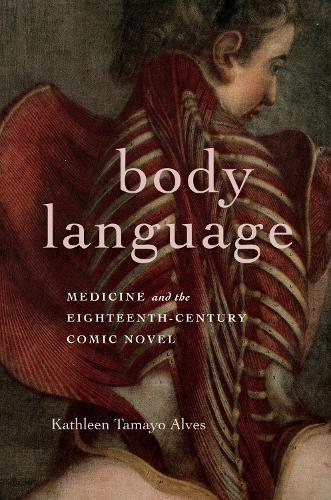Overview
Body Language examines the complex intersections of British eighteenth-century comic fiction and medical discourse. By engaging medical writings of renowned and widely-read physicians of the Enlightenment such as John Freind, Thomas Sydenham, Albrecht von Haller, John Whytt, and William Cullen, with novels of humor by Henry Fielding, Tobias Smollett, Laurence Sterne, and Charlotte Lennox, Alves explains how medicine shaped comic language by dramatizing female-specific phenomena like menstruation, hysteria, nervous disorders, and pregnancy.In these novels, the medical belief that women are incapable of bodily self-regulation becomes an imperative for policing women’s bodies and highlights the enduring shortcomings of patriarchal systems. Ultimately, these comic representations offer a counternarrative of women’s bodies, agency, and selfhood, exposing masculine anxieties about the effectiveness of marriage to regulate women’s sexuality. Published by Bucknell University Press. Distributed worldwide by Rutgers University Press.
Full Product Details
Author: Kathleen Tamayo Alves
Publisher: Bucknell University Press,U.S.
Imprint: Bucknell University Press,U.S.
Weight: 0.454kg
ISBN: 9781684485703
ISBN 10: 1684485703
Pages: 200
Publication Date: 11 November 2025
Recommended Age: From 18 to 99 years
Audience:
College/higher education
,
Professional and scholarly
,
Professional and scholarly
,
Postgraduate, Research & Scholarly
,
Professional & Vocational
Format: Paperback
Publisher's Status: Forthcoming
Availability: Not yet available

This item is yet to be released. You can pre-order this item and we will dispatch it to you upon its release.
Reviews
""An erudite, engaging account of how eighteenth-century comic novels refigure, in fascinating and unexpected ways, misogynistic medical theories about ciswomen's embodiment. Through meticulous excavation of eighteenth-century medical treatises and highly original close readings of canonical novels by Smollett, Sterne, Fielding, and Lennox, Alves offers compelling new dimensions to the literary histories of medicine, gender, and sexuality. A must-read for specialists and non-specialists alike!""--Jason Farr ""author of Novel Bodies: Disability and Sexuality in Eighteenth-Century British Literature"" ""Body Language artfully weaves an interdisciplinary web of science, sexuality, and reading practices to reveal the feminist potential of comic modes. This incredibly detailed work on the overlooked area of female bodies in comic texts makes a unique and important contribution to scholarship on literature and medicine.""--Laura R. Kremmel ""author of Romantic Medicine and the Gothic Imagination: Morbid Anatomies"" ""A rich exploration of the interrelation of eighteenth-century literature and medicine, Body Language deftly connects the formal constraints on fictional characters to those medical discourse places on living women. Alves's lucid and often deeply funny readings show that a patriarchal medical establishment can find little harder to account for than the ways that women escape efforts to define and constrain them.""--Erin M. Goss ""author of Revealing Bodies: Anatomy, Allegory, and the Grounds of Knowledge in the Long Eighteenth C"" ""Offering deft and stimulating comparisons of eighteenth-century comic fiction and scientific writing, Body Language adds a vital chapter to the study of medicine, literature, and gender in the period. Alves's insightful analysis of seven novels alongside a range of medical texts shows how the female body, as a cultural signifier, can tell new stories.""--Heather Meek ""author of Reimagining Illness: Women Writers and Medicine in Eighteenth-Century Britain""
Author Information
KATHLEEN TAMAYO ALVES is an associate professor of English at Queensborough Community College of The City University of New York. Her research centers on eighteenth-century literature and culture, medicine, and literary history, and she has recently published in Studies in Eighteenth-Century Culture, Eighteenth-Century Fiction, Eighteenth-Century Studies, and The Eighteenth Century: Theory and Interpretation.



